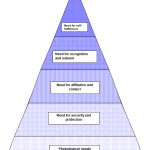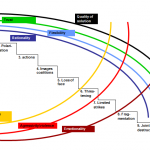Maslow assumes that human behaviour is based on five fundamental needs: – need for self-fulfillment – need for esteem and recognition (self-respect and respect from others) – need for affiliation and love (social needs) – need for security (protection needs) – physiological needs (hunger, thirst etc.) Maslow acts on the assumption that these needs […]
Category Archives: Effizienz
motivation
1. The term "motivation" The word "motivation" comes from the Latin "motivus", meaning to trigger movement. Motivation refers to internal processes (driving forces, needs, attitudes, interests, will) which cause a person to display certain behaviours more often, for longer, more intensively or in a more targeted way (according to Fröhlich & Drever, 1983). Human […]
motivation as an incentive formula
Motivation = Value x Probability Motivation for an action as an incentive to invest time, commitment, money or other resources Subjective value: How important is something to me/the member of staff? Subjective evaluation of the probability that the value will be satisfied by the action. Related terms: Motives, drivers, criteria Subjective probability […]
9 steps of conflict escalation (part 1)
The 9 escalation levels Phase I The conflicting parties are aware of the tensions and contradictions and make efforts to solve them rationally. Failed attempts at solutions contribute to a deepening of the tensions. Despite this, each side makes efforts to work with the opposing party to overcome the conflicts. Cooperation and […]
9 steps of conflict escalation (part 2)
constructive interventions Part 1
constructive confrontation
Dealing with mistakes/unmet expectations How should I as a manager react? What is an appropriate reaction? Failure to react or delayed reactions leads to tacit contracts. The staff member learns that the results behaviour is okay. The manager expects the staff member to read his mind: As a good member of staff he […]
Corkscrew Dialogue
Corkscrew Dialogues: Dive down beneath the visible surface of symptoms to the area of internal motivations, to bring old problems to the surface and air them Example: A woman arrives late. Her husband is ill and she had to take a child to the kindergarten […]
Positiv Führen: „Der Stärkenfinder“
Positiv Führen: „Der Stärkenfinder
Kennen Sie einen Fall, in dem jemand durch eine persönliche Schwäche erfolgreich geworden ist? Nein? Erfolgreich machen einen die Stärken.
Haltet die Zeitdiebe!
„Tempus fugit“, die Zeit flieht, das wussten schon die alten Römer. Heutzutage scheint sie zu rasen, und neben Burnout hat uns die moderne Zeit auch die „hurry sickness“ (die Eilkrankheit) beschert. Wie Sie (wieder) mehr Zeitsouveränität gewinnen.
Unsauberes Motivieren – Die 4 B´s
Unsauberes Motivieren – Die 4 B´s
4 B’s oder lieber 3 E’s? Reinhard Sprenger nennt in seinem Buch „Mythos Motivation“ vier Formen unsauberen Motivierens, zu denen wir uns immer wieder gerne verleiten lassen. Mit vier B´s versucht er es auf den Punkt zu bringen.





